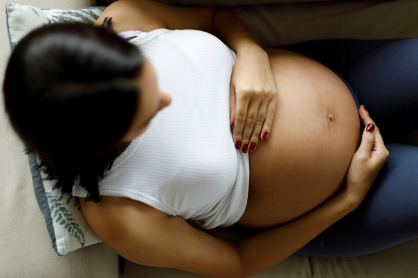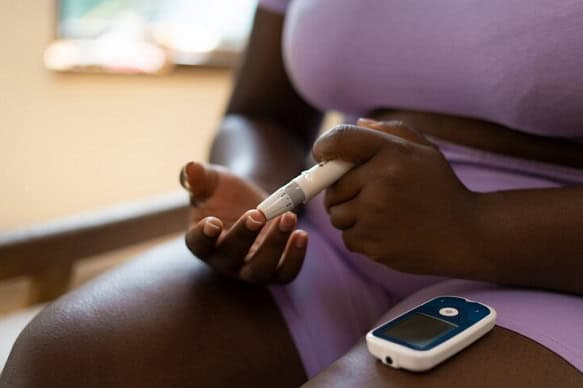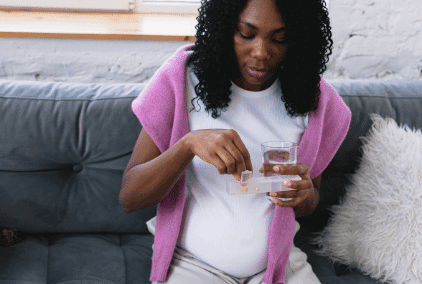
Hormonal imbalances can greatly affect a woman’s ability to conceive because hormones play a very important role in regulating the menstrual cycle, fertility and pregnancy.

The good news is that there are several ways to treat and manage hormonal imbalance so that a woman’s chances of getting pregnant will be increased. In this article, You will learn a lot about how to treat hormonal imbalance to get pregnant.

Hormonal imbalance simply refers to an imbalance in the levels of hormones in the blood. It can either be too little or too much and can disrupt ovulation causing anovulation (lack of ovulation), irregular menstruations and other fertility issues making it difficult for a woman to get pregnant.
Hormones are chemical substances produced by the endocrine glands in the body. They deliver messages round the body. Hormonal balance helps the body function properly.
Hormonal imbalance is common and affects both men and women but in this article, we will only discuss the ones affecting women.
Naturally, a woman’s body experiences hormonal imbalances during puberty, menstrual cycles, pregnancy and menopausal stages.
However, if the hormonal imbalances continue and results in irregular menstruation, absence of ovulation, infertility, etc. Then the need to visit the hospital and have the doctor carry out some tests and examinations will be very important.
The hormones involved in a woman’s fertility journey include oestrogens, progesterone, luteinizing hormone (LH), follicles stimulating hormone (FSH) and thyroid hormone.
Too little or too much of these hormones can result in an imbalance which needs to be treated for pregnancy to be achieved.

Hormonal Imbalance can be caused by:

In order to treat your hormonal imbalance, these tests will help the doctor diagnose if you have a hormonal imbalance or not.
2. Ultrasound and Imaging Tests
3. Tracking Your Menstrual Cycle

The symptoms of a hormonal imbalance depends on the gland affected and it can range from:

Here are options to treat hormonal imbalance to get pregnant. The treatment may include medications, lifestyle changes or supplements. It is best to talk to a doctor to determine which option is best for you.
These are some of the medications that may be prescribed by your doctor to help balance the hormones and improve fertility.
This involves a change in diet, exercise activities and stress management techniques. It has been proven to help treat hormonal imbalance in women who are trying to get pregnant.

It is best to consume a natural diet rich in whole grains, fruits, vegetables, lean proteins and healthy fats. Processed foods are highly discouraged as they may contain chemicals that can act as endocrine disruptors and cause infertility.
Remember to cut down on your sugar intake as well if you are diabetic or have Polycystic Ovary Syndrome (PCOS). Taking supplements like folic acid, vitamin D and omega-3 fatty acids is highly advisable as it may help balance hormones.
Engaging in moderate physical exercises daily will help you maintain a healthy weight and reduce stress.
Practices like yoga, meditation, and deep breathing can help reduce stress and improve hormonal balance. Getting an adequate 7-9 hours of quality sleep every night will also help with hormonal balance. A study review in 2015 shows that sleep affects the way hormones work.
Some studies suggest that alternative therapies like acupuncture may help you treat hormonal imbalance by increasing blood flow to the reproductive organs and reducing stress .
Certain herbs such as Nigella sativa or fennel flower seed were reported to raise estrogen levels in the animal test groups.
A meta-analysis review in 2015 reported that Chinese herbal medicine resulted in double pregnancy rates among participants. A 2016 studyTrusted Source reports that Nigella Sativa, known as black seeds or fennel flower seeds, helped raise estrogen levels in an animal model.

Hormonal Imbalance occurs when the level of hormones in the blood is too much or not enough. It is one of the leading causes of infertility around the world. Polycystic Ovary Syndrome (PCOS) Thyroid disorder, Lacking enough eggs in the ovary, and Obesity are some of the causes.
Treating hormonal imbalance to get pregnant involves several approaches such as medications, lifestyle changes and alternative therapies. By addressing the root causes and making lifestyle changes and using the right medications, many women can treat their hormonal imbalance and get pregnant
Yes, several hormones in a woman’s body can affect her fertility. An example is the thyroid hormones. The thyroid gland produces many hormones, most notably triiodothyronine (T3) and thyroxine (T4) which has been linked to cause infertility in women. Also abnormal levels of Prolactin, FSH, LH, progesterone in the blood can also cause infertility.
Try to avoid processed food and refined carbohydrates as they contain a lot of sugar, unhealthy fats and artificial additives which you do not need. Also avoid red meat, soy products (it contains plant-based estrogens that might interfere with the body’s hormone), alcohol and caffeine.
While diet plays an important role, it is often most effective when combined with medications and lifestyle changes.
The time required to restore hormonal balance varies depending on the underlying cause and treatment approach. It may take several months to see a significant result.
Yes, it is possible, especially with the right medication and lifestyle modifications. Once the ovarian reserve is checked and it is enough and ovulation is regular then your chances of getting pregnant is increased.

Telemedicine offers the option of speaking or chatting with medical professionals online. The convenience and accessibility it offers make it your best option in today’s world where it is not easy to book a doctor’s appointment anymore.
Telemedicine makes it easier and faster to consult a doctor from the comfort of your home. With your smartphone, you can speak with a doctor in a matter of minutes.
With KompleteCare, you can talk to a specialist about your general health concerns, prescriptions, health counseling etc.
If you have any concerns or questions about how to treat hormonal imbalance to get pregnant, do not hesitate to talk to our doctors who are working 24/7 to make sure you are well attended to.
References
Tzu Chi Medical Journal (2020) Role of hypothyroidism and associated pathways in pregnancy and infertility
Frontiers in Endocrinology. (2022). Endocrine disorders and fertility and pregnancy: An update
Ana B.P et al (2023) The role of endocrine disruptors in female infertility
Joy Emeh. (2024). 10 Things to Know About Polycystic Ovarian Syndrome (PCOS)
Ginika Oluchi Okeke (2023). Irregular periods (menstruation)- Causes and home remedies to regulate your cycle.
Ginika Oluchi Okeke (2023). Easy Nigerian foods for 7 day PCOS diet plan.
International Journal of Endocrinology. (2015) The Impact of Sleep and Circadian Disturbance on Hormones and Metabolism
Karin. R et. al. (2015). Chinese herbal medicine for female infertility: an updated meta-analysis
Saadat. P. et al. (2016). Effect of Nigella sativa on reproductive system in experimental menopause rat model
healthcareFebruary 27, 2025
healthcareAugust 20, 2025








